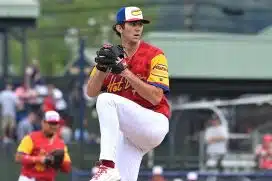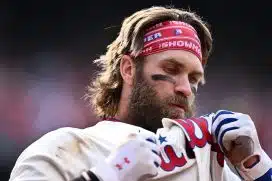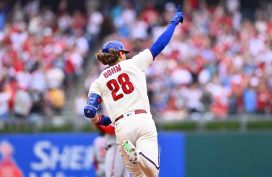By Tim Kelly, Sports Talk Philly editor
Perhaps one of the most refreshing parts about Phillies managing partner John Middleton is that he comes off as very genuine. Fans like that despite the fact that Middleton is one of the richest people in Pennsylvania, he seems to have a fan-like desire (and even impatience) to see the Phillies return to being a National League Power. Heck, he famously told Ryan Howard just minutes after the team failed to repeat as World Champions in 2009 that he wanted the team to get the World Series trophy back the next year, because it was "***** ours."
Middleton's fierce desire for the team to win titles appeals to fans, and even players. Jimmy Rollins, shortly after his tenure with the Phillies came to an end, said he thought that Middleton should be given a chance to be the team's primary owner, and face of the organization. Rollins told Jim Salisbury of NBC Sports Philadelphia that Middleton wanted to be "George Steinbrenner South."
All of that sounds good, right? An owner in a major market has a desire for his team to win a World Series title annually, one that both fans and players seem to like. But there are times when what fans and players want isn't necessarily best for the team's future, and the Phillies are at the back-end of one of those periods right now.
So it appears that part of the job of both president Andy MacPhail and general manager Matt Klentak has become to keep Middleton grounded. It isn't as simple as the Phillies signing the top free-agent every offseason and returning to contention. To his credit, Middleton appears to have bought into following a rebuild similar to that of the Chicago Cubs, but not without MacPhail and Klentak having to remind him of the bigger picture at times.
Phillies Nuggets: An Early Crack At The 2018 Opening Day Lineup
There have been a few different signs in the past few months that Middleton's patience is waning.
In September, Jon Heyman of FanRag Sports reported that some in the Phillies organization were 'getting impatient' with the progress of the team's rebuild. Heyman didn't specifically refer to Middleton when saying this, but it's not hard to figure out that's who he was talking about. MacPhail has historic patience, to which his tenure in Baltimore is a testament of. Klentak, who was with MacPhail in Baltimore and has led much of this rebuild, hasn't seemed to waver much in having the longest view in the room.
Nearly a month later, at his season-ending press conference, MacPhail admitted that it was a tough sell to ownership when he and Klentak told them that the team was likely to have a relatively low payroll in 2018. On one hand, it's easy to understand why Middleton wouldn't initially be happy with a team that's supposed to be moving towards contention having a low payroll, when they are capable of being one of the league's most prolific spenders. But Ryan Howard (his buyout), Michael Saunders, Clay Buchholz, Jeremy Hellickson and Matt Harrison made up nearly half of the team's payroll in 2017. That, in itself, proves that spending at even a medium level doesn't guarantee success. Many of those overpriced veterans have also been replace by pre-arbitration players, so, of course, the Phillies payroll will be relatively low in 2018.
Middleton displayed the honesty that makes him a likable character in a piece that Mike Sielski of The Philadelphia Inquirer wrote last month. He admitted that he's "impatient," but also showed an ability to delegate to those around him. He acknowledged that while Klentak has been active in making trade inquires on controllable starting pitchers – he specifically cited Gerrit Cole and Chris Archer – the price is too high for a trade to come to fruition right now.
Interestingly, there still does seem to be some struggle for Klentak and MacPhail to keep Middleton grounded. Ken Rosenthal of The Athletic said this of the front-office dynamic in his latest long-form piece:
The same dynamic exists in Philadelphia, where owner John Middleton might be ready to move at a faster pace than his GM, Matt Klentak.
The Phillies already have added first baseman Carlos Santana and relievers Pat Neshek and Tommy Hunter for a combined $94.25 million, but rival executives continue to describe the team as actively trying to improve. Trading an outfielder such as Nick Williams or Odubel Herrera for a controllable starter is one option; signing Arrieta might be another. Klentak and president of baseball operations Andy MacPhail were in Baltimore when Arrieta was with the Orioles.
As Matt Breen of The Philadelphia Inquirer noted, MacPhail did note at his season-ending presser that while the Phillies baseball people were able to sell Middleton and ownership on a lower 2018 payroll, they asked that any opportunities to improve the organization "not be excluded." Klentak and company seem to have taken that advice to heart with the Santana signing, one they think will help them be a better team both in 2018 and when they are ready to contend again.
The next task for Klentak and MacPhail may be to effectively communicate why signing Arrieta or trading Herrera for a starting pitcher doesn't fall into the same category as signing Santana.
Even if the price drops for Arrieta, he may not make sense for the Phillies. First of all, he's got a qualifying offer attached to him. By signing Santana, the Phillies had to forfeit their 2018 second and fifth-round picks. If they signed another free-agent with a qualifying offer attached to his candidacy, the Phillies would have to surrender their third and sixth highest draft picks in the 2018 MLB Draft. Beyond the fact that Arrieta has seen a fairly rapid decline over the past two seasons, not having four of your six top picks in the 2018 MLB Draft wouldn't seem to fit into the Phillies organizational plan of building from within. It would seem especially foolish when you consider that the team is unlikely to have a second or fifth-round pick in 2019, because they are a near certainty to sign a free-agent who has been issued a qualifying offer next offseason.
Trending: For Phillies, 2018 Will Be Most Important Calendar Year In Some Time
As far as Herrera, short of him being used to help acquire Marcus Stroman or Michael Fulmer, it doesn't seem to make sense for the Phillies to move him right now. He turned 26 last week, and even in a strange year, Herrera was among the league-leaders in doubles and graded out as one of the top fielders in the sport in 2017. He's certainly not a perfect player, but the Phillies have control of him through 2023, at what will turn out to be a criminally low-rate. He has a chance to be a part of the next great Phillies team. Given what the Chicago White Sox were able to land for Adam Eaton last offseason – a player who has a similar contract structure – Herrera could be used in a bigger trade down the road. As much as the Phillies would like to have someone like Cole or Archer, neither are No. 1 starters on World Series caliber teams. Using Herrera as a chip to acquire one of those two right now feels like it would be extremely shortsighted.
For Middleton and the Phillies, the hardest part of the team's rebuild is probably behind them. That doesn't mean the Phillies will make the playoffs in 2018, but they will get a glimpse of much of their first wave of top prospects at the major league level for an entire season. Next offseason, they figure to be major players in what may be the greatest free-agent class in the history of the sport. Middleton may be impatient, but he's not dumb. He'll get the chance to spend his money over the next five years, but it's important that Klentak and MacPhail continue to stress the importance of having the longest view in the room with Middleton.







